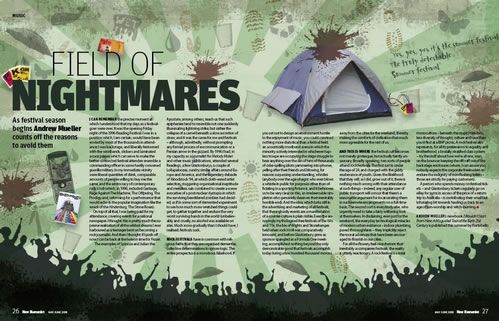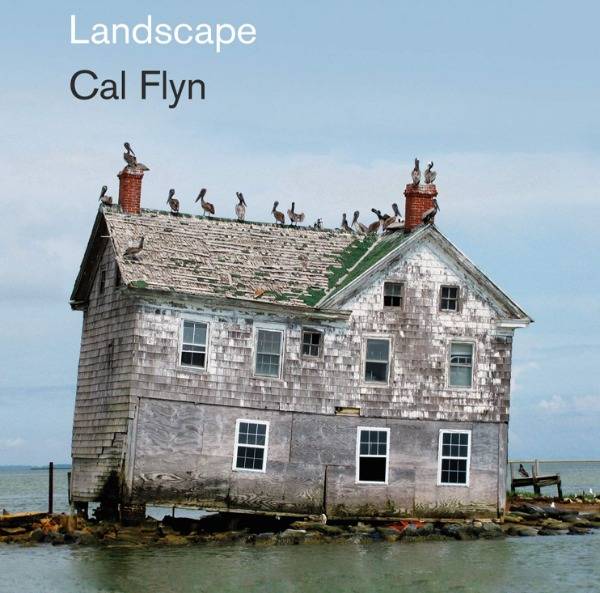
I can remember the precise moment at which I understood that my days as a festival-goer were over. It was the opening Friday night of the 1996 Reading Festival. I was in a position which, I am certain, would have been envied by most of the thousands in attendance: I was backstage, and liberally festooned with the wristbands, stickers and laminated access passes which can serve to make the better-connected festival attendee resemble a commanding officer in some hastily convened guerilla military. In my immediate vicinity were liberal quantities of drink, comparable amounts of people willing to buy me the same, and the aristocracy of contemporary rock’n’roll (which, in 1996, included Garbage, Rage Against The Machine, The Offpsring, The Prodigy and, reforming for a performance that would echo in the popular imagination like the wreck of the Hindenburg, The Stone Roses).
On top of all that, I was being paid for my attendance, covering events for a national newspaper. I thought: this is pretty much the supreme realisation of all the wildest dreams I ever harboured as a teenager bent on becoming a rock journalist. And then I thought: if I push off now, I can be back at the hotel in time for Frasier.
The examples of Spinoza and Julian the Apostate, among others, teach us that such epiphanies tend to resemble not one suddenly illuminating lightning strike, but rather the collapse of a camel beneath a slow accretion of straw, and it was the same for me and festivals – although, admittedly, without prompting any formal process of excommunication or a Persian arrow in the gizzard. By 1996 I had, in my capacity as a journalist for Melody Maker and other music publications, attended several Readings, a few Glastonburys, a couple of Lollapaloozas, sundry similar affairs around Europe and America, and the legendary debacle of Woodstock ‘94, at which cloth-eared artist selection, staggering organisational ineptitude and merciless rain combined to create a scene evocative of a post-nuclear dystopia in which the surviving bewildered zombies had decided, as if in some sort of demented experiment to see how much more wretched things could get, to gather together and endure the very worst surviving bands in the world (unbelievably and cruelly, no alcohol was available on site). Much more gradually than I should have, I realised: festivals suck.
Rock festivals have in common with religious faiths that they are organised dementias, collective determinations to ignore logic. The entire prospectus is a monstrous falsehood. If you set out to design an environment hostile to the enjoyment of music, you could construct nothing more diabolical than a festival field: an acoustically moribund arena in which the minority actively interested in whichever hapless troupe are occupying the stage struggle to hear anything over the din of tens of thousands of cider-spilling idiots yammering into phones, yelling after their friends and blowing, for reasons surpassing understanding, whistles (anybody over the age of eight who ever blows a whistle in public for purposes other than officiating in a sporting fixture is, and it behooves us to be very clear on this, an irredeemable simpleton who genuinely deserves their inevitably horrible end).
And the idea, which lurks still in the advertising and marketing of all festivals, that these ghastly events are a manifestation of a counter-culture is plain risible. Even the annoyingly mythologised free festivals of the ‘60s and ‘70s, the Isle of Wights and Stonehenges held when rock’n’roll was comparatively innocent, and before Glastonbury grew as sponsor-spangled as a Formula One meeting, accomplished nothing beyond the only demonstrable good that festivals accomplish today: luring a few hundred thousand morons away from the cities for the weekend, thereby making the comforts of civilisation that much more agreeable for the rest of us.
And this is where the festival cult becomes not merely grotesque, but actually faintly unsavoury. Broadly speaking, two sorts of people attend rock festivals. The first sort is under the age of 24, and charged with the giddy exuberance of youth. Given the likelihood that they will, as I did, grow out of it, there is nothing much wrong with their attendance at such things – indeed, any regular user of public transport will concur that there’s a reasonable argument for incarcerating them in such remote encampments on a full-time basis. The second sort is everybody else, who urgently need to take a fairly withering look at themselves. In disdaining, even just for the weekend, the everyday technological miracles of modern urban existence – indoor plumbing, paved thoroughfares – they implicitly reject the moral advances that have been encouraged to flourish in our cities.
For all the flowery feel-nice rhetoric that inevitably accompanies festivals, the reality is utterly reactionary. A rock festival is a total monoculture – beneath the stupid hats lurks less diversity of thought, culture and race than you’d find at a BNP picnic. A rock festival also represents, for all its pretensions to equality and brotherhood, a brutally stratified class system – try the stuff about how we’re all one, man, on the bouncer keeping the riff-raff out of the backstage enclosures (where, I can assure you, nobody expects the corporate freeloaders to endure the indignity of non-flushing toilets – those are strictly for paying customers).
A person who spends money on festival tickets – and Glastonbury tickets regularly go on eBay for sums in excess of the price of a return trip to Australia – is contributing their small but infuriating bit towards hauling us back to an age of sun-worship and witch-burning.

